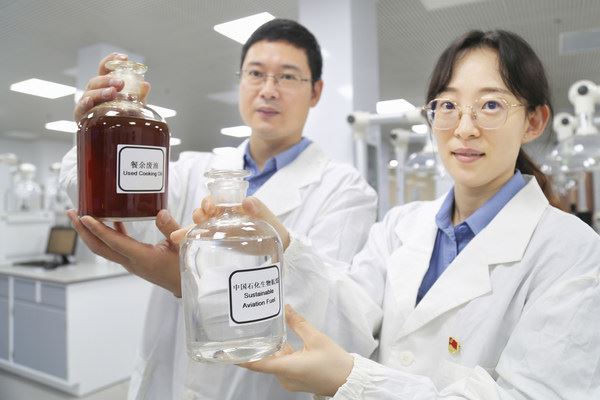Fuel Derived From Used Cooking Oil Underlines Sinopec's Long-term Strategy for Sustainable Development
BEIJING, Sept. 23, 2022 – Sinopec Zhenhai Refinery of China Petroleum & Chemical Corporation (HKG: 0386, "Sinopec") obtained a bio-jet fuel airworthiness certificate issued by the Civil Aviation Administration of China (CAAC) on September 19. The first batch of bio-jet fuel will be shipped to the Airbus (China) Tianjin plant this month. The fuel, derived from used cooking oil, will then be used for flights across China. This will mark the first time that large-scale produced bio-jet fuel will serve the aviation industry in China.

Sinopec Receives Airworthiness Certificate for China’s First Large-Scale Production of Bio-jet Fuel.
The airworthiness certificate means that Sinopec can sell the bio-jet fuel produced at Sinopec Zhenhai Refinery to aviation operators nationwide. The refinery, in the Zhenhai District of Ningbo, Zhejiang province, has an annual designed processing capacity of 100,000 tons and adopts Sinopec's bio-jet fuel production technology (SRJET) to produce the fuel. The plant's first batch in June produced around 600 tons of bio-jet fuel.
"With the airworthiness certificate, Sinopec Zhenhai Refinery can now sell bio-jet fuel to the entire civil aviation market, we will continue to expand the market and supply chain to build a full industry chain of bio-jet fuel," said Mo Dingge, CEO of Sinopec Zhenhai Refinery.
China has strict standards for airworthiness certification. Beforehand, experts from the Airworthiness Certification Center of CAAC conducted on-site evaluations at Sinopec Zhenhai Refinery that covered all stages of operation, including the bio-jet fuel quality management system, production process management and control, product storage and transportation and sample analysis and testing.
The refinery has already obtained Asia's first global RSB sustainable aviation fuel certification issued by Scientific Certification Systems, a key pass for China's bio-jet fuel to enter the international market.
Compared to traditional petroleum-based aviation kerosene, bio-jet fuel can reduce carbon emissions by up to 50 percent throughout the entire lifecycle.
Sinopec is committed to advancing the development of China's bio-jet fuel industry. It developed its SRJET technology in 2009 and produced bio-jet fuel in December 2011 that was successfully tested in flight at Shanghai Hongqiao Airport in April 2013. After two years of evaluation, experts confirmed Sinopec's bio-jet fuel as suitable for operation in aviation, and the company obtained China's first airworthiness certification for bio-jet fuel in 2014.

Contact Us
 Address
Address- 22 Chaoyangmen North Street, Chaoyang District, Beijing, China
 Post code
Post code- 100728
 Tel
Tel- 86(0)10 59960114
Legal Notice
This Website is constructed by China Petrochemical Corporation. (hereinafter referred to as SINOPEC). Please read carefully the following terms...
LEARN MORE






 京公网安备11010502035639
京公网安备11010502035639